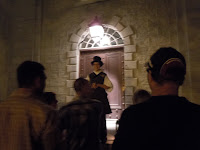I decided to go to the island as well in the car as I wanted to visit the author Félix Leclerc museum that I did not have time to see last year.
Accessed by a large bridge from the mainland, the island has become a real haven for locally grown and harvested products and is a weekend getaway for many city dwellers and tourists alike. Its rural views and lush climate play host to orchards, vineyards, trout fishing and artisanal products ranging from baked goods to apple cider to maple syrup products. At this time of year, the berries are sublime.
Notwithstanding the bountiful and bucolic setting, for me, the highlight of this year's visit to the island was the museum. Félix Leclerc is a huge folk hero to the French Canadians. He began his artistic career as a singer, writing and performing in small clubs in Paris in the early 1950s à la Jacques Brel and Georges Brassens, before making a name for himself in his native Québec: in fact becoming a pioneer of the "new" French Canadian folksong along with La Bolduc. He was a poet at heart and wrote very sentimental verses of th century youth and hard work. He also wrote fables in a kind of hommage to the great fabulist LaFontaine. He wrote short stories, maxims and novels - all paying tribute to love for country, for nature and the land, for family and for life. In the 1970s and 80s he was a great post-Quite Revolution separatist, rallying his people towards a yes vote for a sovereign Québec. From what I have read, the failed separatist referendum in 1985 almost destroyed him, and he more or less retreated from public life until his death in 1988, surfacing only for the occasional interview, private concert and to receive the National Order of Québec from then Premier René Lévesque.
I was capitivated by his simple, heartfelt lyrics and rich, golden voice. It was nice to be transported back in time for a couple of hours.
I left with a couple of his books: poetry and fiction. I think these would make for good reading by students, either in a language class or for pre-trip preparation for study abroad. Much of the more contemporary French Canadian literary canon owes a debt to Félix Leclerc.



























































